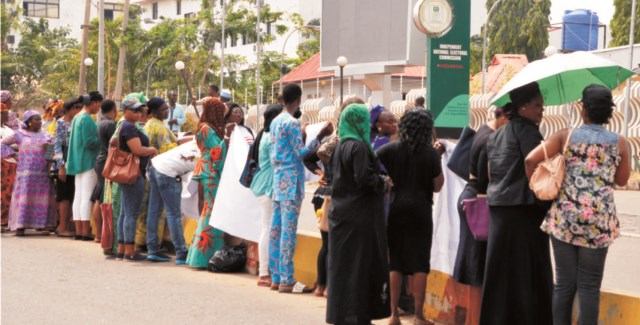Business
2023 Election: Food, Drinks Boom At Polling Units

As voters awaited their turns to make choices on who to occupy the presidential seat of power in the nation for the next four years, smart entrepreneurs who sold food, drinks and water made brisk money in addition to casting of votes.
Cueing up under the hot sun to cast votes provided opportunities for others to make money as hunger and taste sets in.
A food saller at lwofe, Mrs Chidinma Obialor, told The Tide that the election had created opportunity for her to make money from her business.
Mrs. Obialor said people left their houses very early to take numbers at the polling unit and had no alternatives than to patronise her business to avoid fainting.
“No matter how scarce cash is, food is a priority for any human being, who wants to continue living. I know l will make a lot of sales today, so l prepared for it”, she said.
She also noted that water sold more than food, as those who did not have enough money to eat bought water to hold themselves till they were done with voting.
Another entrepreneur, Mrs Ozioma Uchendu, who sells the local zobo drink and water, said her efforts to prepare the zobo drink in addition to water paid off, adding that, “standing on a queue for a long time makes one’s throat to dry up and that is where l am needed.
“I have not seen this number of crowd since l started coming out here to vote. This year’s election pulled crowd but it is unfortunate that the BVAS in our station, Apaogodo Rumuepirikon, Unit 006, Rumueme (7A) refused to work till 1 pm.
She noted that more than 680 voters were disenfranchised, as the officials shot down by 7pm when the crowd have not voted.
Uchendu noted that her being there since morning would have been so painful but for the money she made on selling her drinks, “which is my consolation for spending the whole day here”.
She reiterated the need for Nigeria to grow up, adding that the citizens were thinking that INEC will get it right this time around but, “it is the same old story, no single change in the process instead, it is worse.
Another voter, who pleaded anonymity said the process was nothing but betrayal of trust.
“Nigerians want to continue the suffering, if not, there would have been a firm decision by all, not to be used to pervert the process. I wonder what will ever make me to come out from my house again to participate in the voting process”, he said.
By; Lilian Peters
Business
Fidelity Bank To Empower Women With Sustainable Entrepreneurship Skills, HAP2.0
Business
President Tinubu Approves Extension Ban On Raw Shea Nut Export
Business
Crisis Response: EU-project Delivers New Vet. Clinic To Katsina Govt.
-

 News3 days ago
News3 days agoAmend Constitution To Accommodate State Police, Tinubu Tells Senators
-

 Politics3 days ago
Politics3 days agoSenate Urges Tinubu To Sack CAC Boss
-

 News3 days ago
News3 days agoDisu Takes Over As New IGP …Declares Total War On Corruption, Impunity
-
Business3 days ago
President Tinubu Extends Raw Shea Nuts Export Ban To 2027
-
Business3 days ago
Crisis Response: EU-project Delivers New Vet. Clinic To Katsina Govt.
-
Business3 days ago
President Tinubu Approves Extension Ban On Raw Shea Nut Export
-
Sports3 days ago
NDG: Rivers Coach Appeal To NDDC In Talent Discovery
-
Rivers3 days ago
Etche Clan Urges Govt On Chieftaincy Recognition

